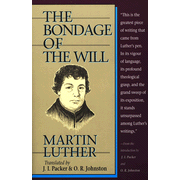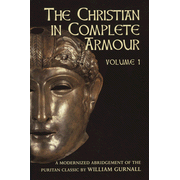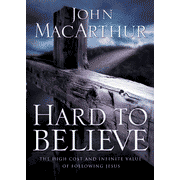It is a great thing to begin the Christian life by believing good solid doctrine. Some people have received twenty different "gospels" in as many years; how many more they will accept before they get to their journey's end, it would be difficult to predict. I thank God that He early taught me the gospel, and I have been so perfectly satisfied with it, that I do not want to know any other.
Why, if I believed what some preach about the temporary, trumpery salvation which only lasts for a time, I would scarcely be at all grateful for it; but when I know that those whom God saves He saves with an everlasting salvation, when I know that He gives to them an everlasting righteousness, when I know that He settles them on an everlasting foundation of everlasting love, and that He will bring them to His everlasting kingdom, oh, then I do wonder, and I am astonished that such a blessing as this should ever have been given to me!
I suppose there are some persons whose minds naturally incline towards the doctrine of free-will. I can only say that mine inclines as naturally towards the doctrines of sovereign grace. Sometimes, when I see some of the worst characters in the street, I feel as if my heart must burst forth in tears of gratitude that if God had left me alone and had not touched me by His grace, what a great sinner I should have been! I should have run to the utmost lengths of sin, dived into the very depths of evil, nor should I have stopped at any vice or folly, if God had not restrained me. I feel that I should have been a very king of sinners, if God had let me alone.
I cannot understand the reason why I am saved, except upon the ground that God would have it so. I cannot, if I look ever so earnestly, discover any kind of reason in myself why I should be a partaker of Diving grace. If I am not at this moment without Christ, it is only because Christ Jesus would have His will with me, and that will was that I should be with Him where He is, and should share His glory. I can put the crown nowhere but upon the head of Him whose mighty grace has saved me from going down into the pit. It was He who turned my heart, and brought me down on my knees before Him.
Well can I remember the manner in which I learned the doctrines of grace in a single instant. Born, as all of us are by nature, an Arminian, I still believed the old things I had heard continually from the pulpit, and did not see the grace of God. When I was coming to Christ, I thought I was doing it all myself, and though I sought the Lord earnestly, I had no idea the Lord was seeking me. I do not think the young convert is at first aware of this. I can recall the very day and hour when first I received those truths in my own soul when they were, as John Bunyan says, burnt into my heart as with a hot iron, and I can recollect how I felt that I had grown on a sudden from a babe into a man that had made progress in Scriptural knowledge, through having found, once for all, the clue to the truth of God.
One week-night, when I was sitting in the house of God, I was not thinking much about the preacher's sermon, for I did not believe it. The thought struck me, "How did you come to be a Christian?" I sought the Lord. "But how did you come to seek the Lord?" The truth flashed across my mind in a moment I should not have sought Him unless there had been some previous influence in my mind to make me seek Him. I prayed, thought I, but then I asked myself, How came I to pray? I was induced to pray by reading the Scriptures. How came I to read the Scriptures? I did read them, but what led me to do so? Then, in a moment, I saw that God was at the bottom of it all, and that He was the Author of my faith, and so the whole doctrine of grace opened up to me, and from that doctrine I have not departed to this day, and I desire to make this my constant confession, "I ascribe my change wholly to God."
I once attended a service where the text happened to be, "He shall choose our inheritance for us;" and the good man who occupied the pulpit was more than a little of an Arminian. Therefore, when he commenced, he said, "This passage refers entirely to our temporal inheritance, it has nothing whatever to do with our everlasting destiny, for," said he, "we do not want Christ to choose for us in the matter of Heaven or hell. It is so plain and easy, that every man who has a grain of common sense will choose Heaven, and any person would know better than to choose hell. We have no need of any superior intelligence, or any greater Being, to choose Heaven or hell for us. It is left to our own free-will, and we have enough wisdom given us, sufficiently correct means to judge for ourselves," and therefore, as he very logically inferred, there was no necessity for Jesus Christ, or anyone, to make a choice for us. We could choose the inheritance for ourselves without any assistance. "Ah!" I thought, "but, my good brother, it may be very true that we could, but I think we should want something more than common sense before we should choose aright."
First, let me ask, must we not all of us admit an over-ruling Providence, and the appointment of Jehovah's hand, as to the means whereby we came into this world? Those men who think that, afterwards, we are left to our own free-will to choose this one or the other to direct our steps, must admit that our entrance into the world was not of our own will, but that God had then to choose for us. What circumstances were those in our power which led us to elect certain persons to be our parents? Had we anything to do with it? Did not God Himself appoint our parents, native place, and friends?
John Newton used to tell a whimsical story of a good woman who said, in order to prove the doctrine of election, "Ah! sir, the Lord must have loved me before I was born, or else He would not have seen anything in me to love afterwards." I am sure it is true in my case; I believe the doctrine of election, because I am quite certain that, if God had not chosen me, I should never have chosen Him; and I am sure He chose me before I was born, or else He never would have chosen me afterwards; and He must have elected me for reasons unknown to me, for I never could find any reason in myself why He should have looked upon me with special love.
If it would be marvelous to see one river leap up from the earth full-grown, what would it be to gaze upon a vast spring from which all the rivers of the earth should at once come bubbling up, a million of them born at a birth? What a vision would it be! Who can conceive it. And yet the love of God is that fountain, form which all the rivers of mercy, which have ever gladdened our race all the rivers of grace in time, and of glory hereafter take their rise. My soul, stand thou at that sacred fountainhead, and adore and magnify for ever and ever God, even our Father, who hath loved us! In the very beginning, when this great universe lay in the mind of God, like unborn forests in the acorn cup; long ere the echoes awoke the solitudes; before the mountains ere brought forth; and long ere the light flashed through the sky, God loved His chosen creatures. Before there was any created being when the ether was not fanned by an angel's wing, when space itself had not an existence, when there was nothing save God alone even then, in that loneliness of Deity, and in that deep quiet and profundity, His heart moved with love for His chosen. Their names were written on His heart, and then were they dear to His soul. Jesus loved His people before the foundation of the world even from eternity! and when He called me by His grace, He said to me, "I have loved thee with an everlasting love: therefore with loving-kindness have I drawn thee."
If anyone should ask me what I mean by a Calvinist, I should reply, "He is one who says, Salvation of the Lord." I cannot find in Scripture any other doctrine than this. It is the essence of the Bible. "He only is my rock and my salvation." Tell me anything contrary to this truth, and it will be a heresy; tell me a heresy, and I shall find its essence here, that it has departed from this great, this fundamental, this rock-truth, "God is my rock and my salvation."
What is the heresy of Rome, but the addition of something to the perfect merits of Jesus Christ the bringing in of the works of the flesh, to assist in our justification? And what is the heresy of Arminianism but the addition of something to the work of the Redeemer? Every heresy, if brought to the touch-stone, will discover itself here.
I have my own private opinion that there is no such thing as preaching Christ and Him crucified, unless we preach what nowadays is called Calvinism. It is a nickname to call it Calvinism; Calvinism is the gospel, and nothing else. I do not believe we can preach the gospel, if we do not preach justification by faith, without works; nor unless we preach the sovereignty of God in His dispensation of grace; nor unless we exalt the electing, unchangeable, eternal, immutable, conquering love of Jehovah; nor do I think we can preach the gospel, unless we base it upon the special and particular redemption of His elect and chosen people which Christ wrought out upon the cross; nor can I comprehend a gospel which lets saints fall away after they are called, and suffers the children of God to be burned in the fires of damnation after having once believed in Jesus. Such a gospel I abhor.
There is no soul living who holds more firmly to the doctrines of grace than I do, and if any man asks me whether I am ashamed to be called a Calvinist, I answer I wish to be called nothing but a Christian; but if you ask me, do I hold the doctrinal views which were held by John Calvin, I reply, I do in the main hold them, and rejoice to avow it.
But far be it from me even to imagine that Zion contains none but Calvinistic Christians within her walls, or that there are none saved who do not hold our views. I believe there are multitudes of men who cannot see these truths, or, at least, cannot see them in the way in which we put them, who nevertheless have received Christ as their Saviour, and are as dear to the heart of the God of grace as the soundest Calvinist in or out of Heaven.
It is often said that the doctrines we believe have a tendency to lead us to sin. I have heard it asserted most positively, that those high doctrines which we love, and which we find in the Scriptures, are licentious ones. I do not know who will have the hardihood to make that assertion, when they consider that the holiest of men have been believers in them. I ask the man who dares to say that Calvinism is a licentious religion, what he thinks of the character of Augustine, or Calvin, or Whitefield, who in successive ages were the great exponents of the system of grace; or what will he say of the Puritans, whose works are full of them? Had a man been an Arminian in those days, he would have been accounted the vilest heretic breathing, but now we are looked upon as the heretics, and they as the orthodox.
We have gone back to the old school; we can trace our descent from the apostles. It is that vein of free-grace, running through the sermonizing of Baptists, which has saved us as a denomination. Were it not for that, we should not stand where we are today. We can run a golden line up to Jesus Christ Himself, through a holy succession of mighty fathers, who all held these glorious truths; and we can ask concerning them, "Where will you find holier and better men in the world?" No doctrine is so calculated to preserve a man from sin as the doctrine of the grace of God. Those who have called it "a licentious doctrine" did not know anything at all about it. Poor ignorant things, they little knew that their own vile stuff was the most licentious doctrine under Heaven. If they knew the grace of God in truth, they would soon see that there was no preservative from lying like a knowledge that we are elect of God from the foundation of the world. There is nothing like a belief in my eternal perseverance, and the immutability of my Father's affection, which can keep me near to Him from a motive of simple gratitude. Nothing makes a man so virtuous as belief of the truth. A lying doctrine will soon beget a lying practice. A man cannot have an erroneous belief without by-and-by having an erroneous life. I believe the one thing naturally begets the other.
Of all men, those have the most disinterested piety, the sublimest reverence, the most ardent devotion, who believe that they are saved by grace, without works, through faith, and that not of themselves, it is the gift of God.
Christians should take heed, and see that it always is so, lest by any means Christ should be crucified afresh, and put to an open shame.
skip to main |
skip to sidebar


Sola scriptura Sola fide Sola gratia Solus Christus Soli Deo Gloria






Germany

England

America

Scotland

















a reformed christian theological blog
Under Grace TV


Sola scriptura Sola fide Sola gratia Solus Christus Soli Deo Gloria
Contributors
Under Grace Archive
Resources
All resources are property of the creators
Apologetics (Links and videos)
- Josh McDowwel
- Lee Strobel
- Love is the Fullfillment of the Law- Paul Washer (Video)
- Dr. Oakley1689's YouTube (Lots of Apologetics videos)
- Who is Jesus?- lutheranman (Video)
- Homosexuality- lutheranman (video)
- Do Infidels Reject Because of Reason? No, Irationality- Martyn-Llyod Jones (Video)
- What do We Need Above All?- Paul Washer (Video)
- The Gospel, Preaching, Commitment, Etc.- Paul Washer (Video)
- Alpha Omega Ministries
- The Narrow Way- Paul Washer (Video)
- Another Mormon bashing video...or is it?- Oct311517 (Video)
- Islamic Arguments- Dr. White (Video)
Links
- Shepherd Files
- Audience One
- Amazon
- Banner of Truth Trust
- Bible Maps
- Bible Gateway
- http://bloodtippedears.blogspot.com
- Christian Classics Ethereal Library
- Desiring God
- Grace to You
- HeartCry Missionary Society (Paul Washer)
- Josh McDowell
- Lee Strobel
- Ligonier Ministries
- Michael Card
- Monergism
- Monergism Books
- One Place
- Arthur W. Pink Archive
- Fire and Ice: Puritan and Reformed Writings
- Reformation Theology
- Reformed Voices
- Rivers of the World
- Sermon Audio
- The Spurgeon Archive
- CAMPONTHIS
- The Grace Life Pulpit
- The Masters Seminary
- Truth for Life
- Wikipedia
- Blaze25z's You Tube
- LaneCh's You Tube
- Lutheranman's You Tube





Classical protestant writings from...

Germany

England

America

Scotland
Become an Affliate of Monergism
Bible Gateway
The link text
>>>>
Christian Book Distributers
Reccomended Reads




























No comments:
Post a Comment